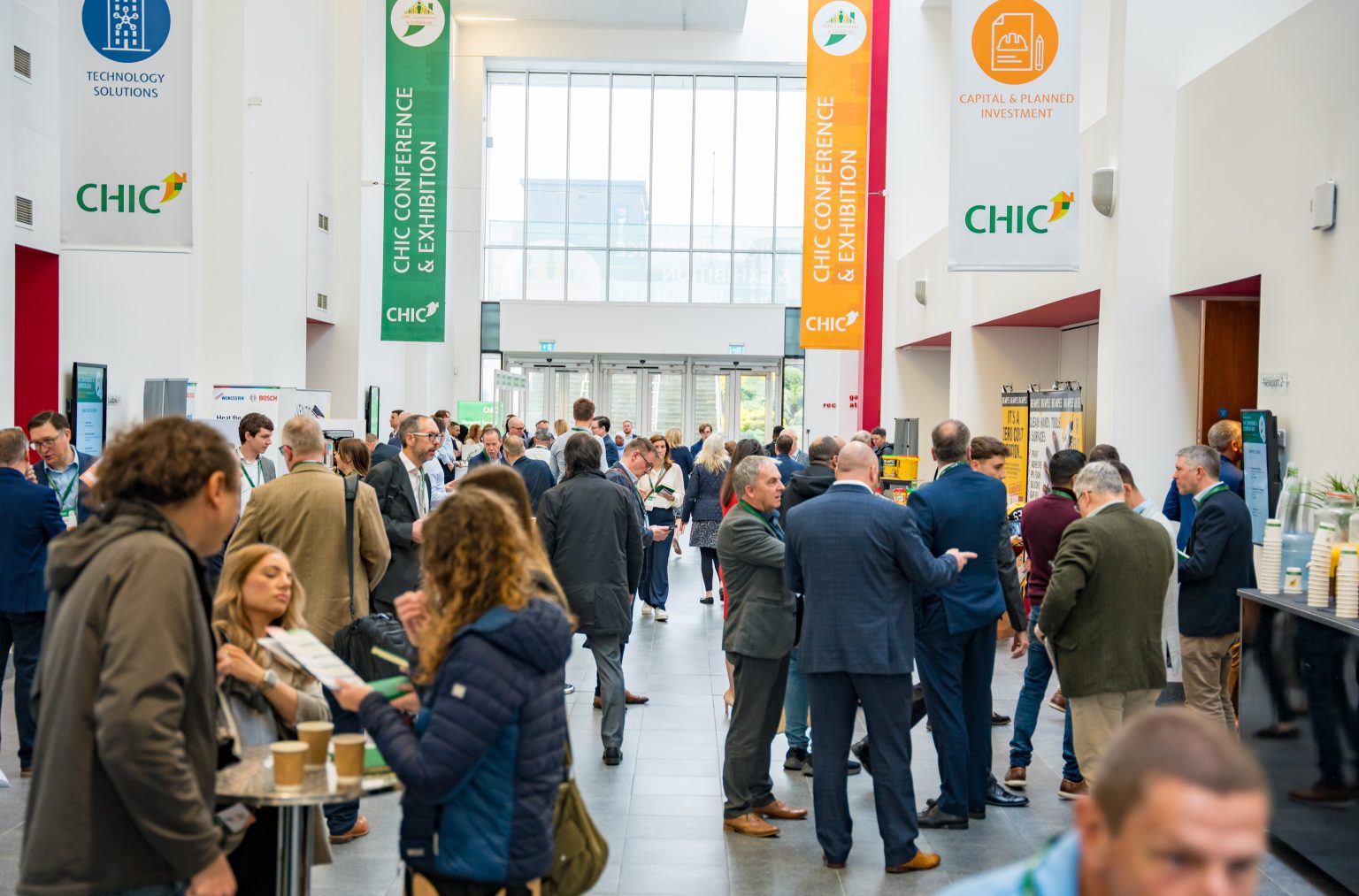Introduction
The CHIC Conference & Exhibition 2025 brought together key voices from across the housing sector to tackle pressing challenges and share innovative strategies that can shape the future of social housing. With the overarching theme “Housing Matters Now,” the sessions featured wide ranging discussions on safety, sustainability, procurement, social value and the crucial role of community in the delivery of housing services. Feedback and session summaries were provided by Andy Cameron-Smith, Harry Palmer from the Housing Executive and Hannah Elliott from CHIC, who each brought their experience to capture the nuance and depth of each workshop. This following paper outlines the key takeaways from these discussions.
Putting Residents First in Building Safety
The conference opened with a conversation on building safety, moderated by journalist Mark Easton. The session underscored that true safety is not just about compliance, but about how residents feel in their homes. Panellists Mike Rennie (DorSuite), Jonathan Parkes (Epic Housing) and Gary Clay (Novus) emphasised that co-creation and resident collaboration are crucial in delivering safety initiatives that resonate. Mike Rennie argued that while safety starts at the door, trust and support must extend beyond it. Safety, he said, is as much emotional as it is technical. Jonathan Parkes called for a “people first” rather than “paper first” approach, proposing that tenants be treated as partners, not passive recipients. Gary Clay added that understanding the tenant profile and fostering long term strategic partnerships are foundational to successful projects. Audience concerns reflected this ethos, raising questions about training in relationship building, the risks of overcommunication and how best to bridge the technology gap.
Making Communities Work
Chaired by journalist Vicky Spratt, this panel featured perspectives from both professionals and residents on community engagement. Speakers such as Fleur Hemming (Bournville Village Trust), Kai Jackson (BCHG) and Helen Scurr (ARK Consultancy) discussed how housing associations go beyond construction to invest in the social fabric of communities. Fleur highlighted the importance of youth engagement and the creation of multi generational spaces that build long term resilience. Trust, environmental care and resident involvement emerged as pillars of sustainable community development. Kai Jackson aptly summarised the sentiment by stating, “People just want to connect with a person.” The discussion reinforced that communication, particularly face to face, is critical in mitigating digital exclusion and maintaining trust. Transparent and empathetic handling of disruptions like retrofits also emerged as key to successful community relations.
Do Mergers Help Us Build New Homes?
In an interview conducted by journalist Vicky Spratt, David Wells of Housing Plus Group explored the implications of mergers in the housing sector. Drawing on recent experience with the merger between Wrekin Housing Group and Housing Plus Group, David argued that while mergers can increase capacity, they are not inherently a silver bullet. True success hinges on preserving resident care and ensuring continuity amid expansion. Ideological differences, particularly regarding housing providers assuming roles traditionally held by the state, add complexity. The conversation emphasised that mergers must be thoughtfully planned, with transparent communication at every stage. Mergers without vision can lead to overstretching, undermining both growth and the quality of care.
Asset Management – Best in Class – Integrating Data, Net Zero and Decent Homes
This session brought together Lee Wood (Birmingham City Council), Mark Jones (Synergize) and Carl Yale (Lovell Partnerships) to explore how landlords can develop asset strategies that balance decarbonisation, decent homes and resident wellbeing. Chaired by Mark, the discussion focused on the urgent need for robust data, integrated planning and early engagement with delivery partners. Lee spoke to the challenges of aligning net zero with existing housing pressures in a large local authority, while Mark highlighted the importance of turning asset insights into actionable investment plans. Matt offered the contractor perspective, calling for earlier collaboration and clearer client briefs to ensure delivery is efficient and resident-focused. All agreed that successful asset management requires joined up thinking, better usage of systems and a commitment to putting residents at the centre of decisions.
What Do Supply Chains Need from the Perfect Client?
Helen Schoolar (Jewson) and Chris Chapman (Broad Oak) provided insights into the dynamics of supplier-client relationships in the housing sector. Their key message was that strong partnerships stem from early engagement and a detailed understanding of stock performance beyond desktop data. Clients should provide comprehensive and flexible data and focus on lifecycle costs rather than just initial outlay. Legislation changes demand agility, which is best achieved through collaborative planning. The session stressed quality over price and highlighted the importance of communicating clearly with suppliers and residents. Retrofit, a central priority, was framed as both a technical and social challenge, requiring careful planning and resident engagement. Training for client staff through suppliers was also identified as a practical solution to skills gaps.
Procurement Changes: Opportunities and Obstacles
Professor Jo Meehan, Brendan Ryan and Sam Domican discussed the implications of the new Procurement Act. While the reforms aim to boost transparency and social value, they fall short in enforceability, particularly regarding support for SMEs. Social value, they argued, must be about addressing systemic inequalities rather than being reduced to check box metrics. Despite the inclusion of procedures like the Open Procedure and Competitive Flexible Procedure, the panel cautioned that larger organisations may still exploit the system. The conversation called for a more honest and transformative interpretation of social value, rooted in meaningful change rather than compliance driven exercises.
Net Zero Homes: Are We on Track?
Moderated by Vicky Spratt, this session examined the sectors progress towards net zero. Deborah Casey (Homes England), Matthew Allcock (Baily Garner) and Gemma Brookes (Orbit) all agreed: we are not moving fast enough. The high upfront cost of retrofitting and slow policy momentum were highlighted as major barriers. All speakers stressed the importance of using detailed asset data to inform decision making and retrofit strategies. There is a growing perception of equity concerns, whether existing residents are being left behind while funds are funnelled into new builds. The audience raised pertinent questions about integration, workforce readiness and benchmarks, suggesting a sector hungry for actionable, data driven roadmaps.
New Build Development: Can We Deliver 1.5m Homes?
In this panel led by Mark Easton, speakers including Regan Costello (Seddon), Andrew Carpenter (Constructing Excellence) and Michael Baggett (Platform Housing) questioned the feasibility of Labour’s target to build 1.5 million new homes. Output remains far too low, with land availability, inflation and planning bottlenecks cited as key challenges. The role of Modern Methods of Construction (MMC) remains undefined, though it holds promise for boosting capacity and efficiency. Andrew Carpenter noted the timber sector’s potential in reducing carbon footprint. Long term partnerships and better planning were presented as crucial strategies. Audience questions reflected concern over policy clarity, community resistance (NIMBYism) and the capacity of local industries.
What Does Added Social Value Really Look Like?
Closing the day, this session explored how social value should be measured and understood. Heather Lawson (HACT) and Samantha Hine (Housing Plus Group) advocated for a granular, person centred approach. Social value should be embedded in both preventative and responsive strategies, ranging from employment support to community revitalisation. HACT’s Social Value Bank was presented as a valuable framework for placing monetary value on qualitative benefits. Importantly, Housing Plus Group demonstrated that prioritising social value is compatible with growth and mergers when approached with the right mindset. Social value must be about measurable, lived change, not abstract or token metrics.
Conclusion
The CHIC Conference 2025 workshops provided clear and practical insights into the pressing challenges and opportunities facing social landlords today. Whether discussing resident safety, community development, procurement, or the road to net zero, one theme stood out: success depends on collaboration, planning and listening – especially to residents. From merging organisations to managing assets, social housing providers are being asked to do more with less. These sessions reinforced that meeting those expectations requires not only technical expertise but also transparency, empathy and a people first mindset.
With a new Labour government now in place and housing moving higher up the political agenda, there is a renewed sense of momentum and opportunity to drive meaningful reform. The time to act is now. As the conference theme “Housing Matters Now” reminded us, the sector must seize this political moment to deliver the safe, sustainable and socially valuable homes our communities urgently need. The path ahead is complex, but the insights shared at the conference show that the sector is not only ready for the challenge, but it’s already rising to meet it. Let’s hope that in our 2026 conference, we can demonstrate these triumphs.



